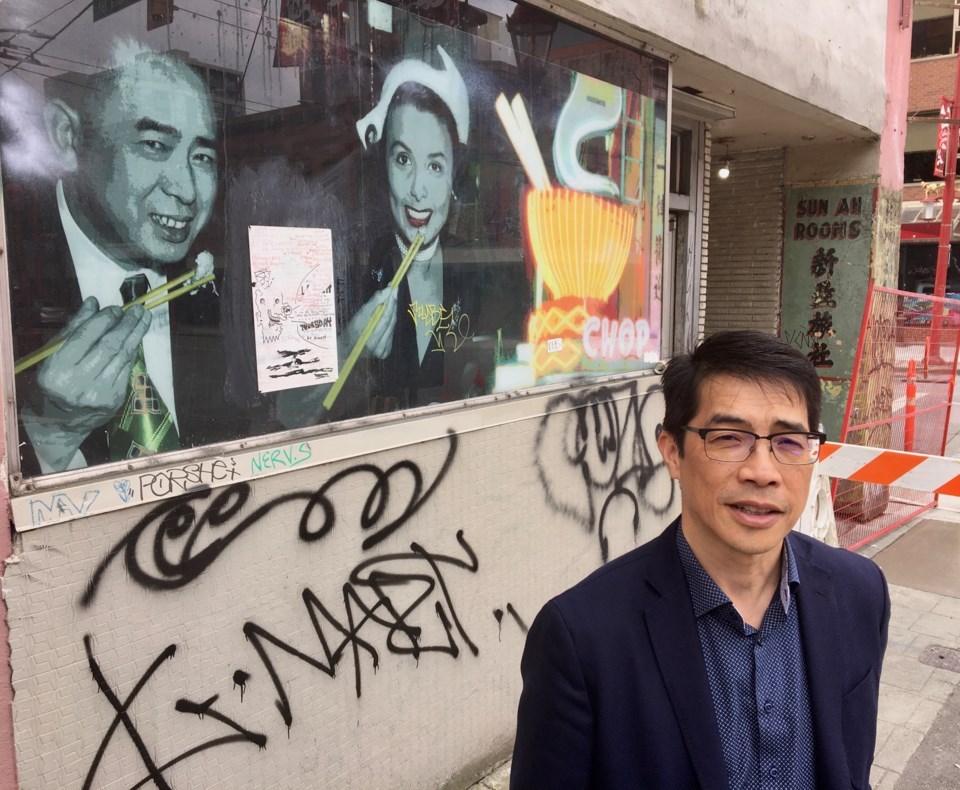Vancouver city council approved Tuesday $500,000 for 22 business improvement associations to tackle graffiti in their neighbourhoods and committed another $20,000 to artists, non-profits and others to assist in reducing tagging on private and public property.
The $20,000 commitment was not included in the staff report but was added after council heard from Downtown Eastside artist Trey Helten about the art and outreach that he and Jamie Hardy (also known as Smokey Devil) are doing in Chinatown.
Helten told council that he and Hardy have used their own money to paint murals in Chinatown and are working with business owners to reduce the widespread graffiti that has plagued the historic community.
“Myself and Smokey have been taking it upon ourselves to just basically go in and help Chinatown as neighbours within the Downtown Eastside,” said Helten, who belongs to the Downtown Eastside Artists Collective.
'Sanctioned graffiti zones'
After hearing from Helten, council unanimously agreed to have staff return at a later date with a separate report that would unlock $20,000 for a program aimed at having artists’ collectives, restorative justice organizations, non-profits and peer employment organizations work with young people doing graffiti and mentor them.
Council also directed staff to connect with business improvement associations, the street art community and related organizations to designate sanctioned graffiti zones in an effort to reduce businesses being tagged by graffiti.
“We've heard that there's been a huge increase in graffiti, and maybe one of the ways of working at it isn't just by erasing it, but by actually trying to build a relationship with the folks that are doing it,” said Coun. Jean Swanson, who introduced the amendment that led to the $20,000 commitment.
“Maybe with a tiny grant like this, it could help. Trey and Smokey have offered their services, and I think we should take them up on it.”
Council heard from staff that graffiti has spiked across the city since the pandemic was declared in March 2020: a total of 6,400 case files were created in 2021 for graffiti complaints logged by the city’s 311 phone service.
335 gallons of paint
The city’s graffiti removal contractor, Goodbye Graffiti, which is responsible for painting over graffiti on city buildings, property and infrastructure, removed more than 150,000 tags in 2021, an increase of 49 per cent from 2019.
The city also saw a significant increase in the amount of free paint it distributed to Vancouver property owners and tenants, who can receive up to two gallons of exterior paint in a calendar year for graffiti removal.
In 2021, the city handed out 335 gallons of paint — an increase from 240 gallons in 2020 and 175 gallons in 2019.
The increase in what staff described as “nuisance graffiti” is thought to be largely connected to a drop in people on the streets, although the lifting of public health restrictions has seen a recent and noticeable increase in pedestrian traffic across the city.
The $500,000 granted to the business improvement associations is to help remove graffiti from private buildings and give them the option to use the money to fund the painting of murals in their neighbourhoods.
Any hate graffiti identified on private or public property is removed by Goodbye Graffiti.
'Fairly shoddy'
Neil Wyles, executive director of the Mount Pleasant Business Improvement Association, told council that he welcomed the funds but expressed frustration at the magnitude of the graffiti problem.
“The city, through Goodbye Graffiti, does everything on city property, but there's a lot of things that fall in between the cracks,” Wyles said.
“And no matter how good Goodbye does their work, or my contractor does their work, there's still all those dumpsters, telephone poles, all of the traffic boxes, etcetera, etcetera that make the areas look fairly shoddy.”
Wyles said he would be open to discussing ways with Helten and Hardy to educate some of the prolific taggers in Mount Pleasant.
“Because I would rather be doing other things to beautify and improve my neighbourhood than just keep cleaning up the pointless tags,” he said.
Downtown and Chinatown have seen the worst of the graffiti, and that was recognized by council in granting each of those districts’ business improvement associations $50,000 each.
'Dog chasing his tail'
Jordan Eng, president of the Chinatown Business Improvement Association Society, welcomed the money but likened it to a Band-Aid solution to the larger problem of drug-fuelled street disorder and crime.
The spike in anti-Asian hate crimes since the pandemic was declared has also had a negative effect on Chinatown, he said prior to the council meeting, noting he welcomed an increased police presence in the streets.
At the same time, he added, any real positive change on how to address social issues of drug use and poverty has to come from all levels of government.
In the meantime, the graffiti continues.
“You clean it up one day and within a couple of days it’s back again,” he said. “It's kind of the dog chasing his tail sort of thing.”
@Howellings


